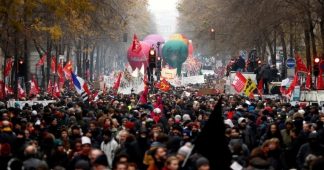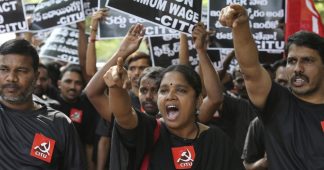By Alice Summers
Nov 24, 2021
(AP Photo/Javier Fergo)
Yesterday, as the strike of over 22,000 metalworkers in the southern Spanish city of Cádiz for pay increases and against plant closures entered into its second week, the social-democratic Socialist Party (PSOE) and the “left populist” Podemos party launched a police crackdown. They unleashed thousands of riot police and a 15-ton BMR (Blindado Medio sobre Ruedas, or Medium Armoured Vehicle on Wheels) in Cádiz.
On Tuesday, around 5,000 metalworkers and supporters marched through Cádiz. A number of workers split off from the main demonstration and tried to block the Carranza bridge with barricades. Police attacked the workers with tear gas and rubber bullets. At least one protester was arrested on supposed public disorder charges. The demonstrators shouted slogans such as “The police kill!” and “We are workers, not criminals!”
There is widespread support for the strike. Around 200 local students from the third grade through to secondary level took part in a school strike on Tuesday, setting up pickets outside their schools and joining the metalworkers’ protest. Demonstrators shouted support for health workers as they passed by Puerta del Mar hospital, with healthcare workers responding with applause for the strikers and students.
Cádiz residents were outraged by the deployment of the 15-ton armoured BMR, one of two such vehicles retired from the armed forces and handed to the Spanish National Police in 2017. It marked the first time that a BMR has been deployed against striking workers in Spain. The BMR drove through working-class neighbourhoods of San Pedro and Bazán and near local schools, crashing through obstacles on the street. Many residents shouted slogans denouncing the BMR from the balconies of their homes.
The deployment of the a military vehicle to Cádiz is a desperate threat against this powerful strike, and a comprehensive exposure of the PSOE-Podemos government. It has already proved its visceral hostility to the working class, consistently adopting the fascistic Vox party’s policies, from ending COVID-19 health restrictions to implementing violent anti–migrant policies. Making undeniably clear the class gulf separating Podemos from the workers, it is now threatening the working class with militarized violence.
From the first days of the strike, the PSOE-Podemos government has mobilised riot police from across Spain to assault workers with pepper spray, truncheons and rubber bullets.
Workers responded by setting up pickets and barricades blocking the way to the city’s industrial district and other major highways; they burnt cars, bins and rail tracks to prevent police from accessing the area. Buses attempting to ferry scabs to the factories were forced to turn around after strikers blocked the road and threw stones.
An explosive political situation is emerging in Spain, as broad masses of working people support the strike against the PSOE-Podemos government. Large protests in support of the metalworkers have been held in Cádiz, with demonstrators carrying banners with slogans such as “Working class unite!” Further solidarity demonstrations took place in other cities across the region of Andalusia, with more scheduled to take place throughout the week.
On Monday, approximately 4,000 workers and youth in the town of Algeciras, part of the larger Cádiz province, protested in solidarity with the striking metalworkers. A further solidarity protest was called on Monday in the nearby city of Huelva. Around 300 protesters also gathered in front of the Palacio de San Telmo in Seville—the seat of the Andalusian regional government—the same day in a show of support for the workers in Cádiz.
Members of Podemos and the Stalinist Spanish Communist Party (PCE)—which also governs as part of the Unidas Podemos electoral alliance—were jeered when they tried to address the assembled workers in Seville. One PCE representative attempted to defend the party, ludicrously claiming that “We are in government, but not in power,” but workers responded with further booing.
The best ally of strikers in Cádiz against Podemos and the PSOE are workers internationally who, like Spanish steelworkers, are striking against real wage cuts, industrial and economic dislocation, and mass deaths caused by the criminal official handling of the COVID-19 pandemic.
The Cádiz strike comes amid an upsurge of the class struggle across Europe and internationally. Numerous strikes are scheduled in Spain by the end of the year, including by meat processing workers, lorry drivers, and supermarket workers. In neighbouring Portugal, tens of thousands of workers across multiple industries took strike action in September and October, including rail workers, teachers, hospital workers and prison guards.
In the United States, dozens of strikes have broken out since October, involving carpenters, transit workers, auto workers, nurses, film production workers, and airline crew workers, among numerous other sectors of the economy.
Across the world, strikes against worsening living and working conditions, exacerbated by the coronavirus pandemic, are bringing workers into a headlong conflict not only with the companies, but with the trade union bureaucracies and nominally “left” capitalist governments.
In Spain, the Podemos party has cynically attempted to posture as sympathetic to the strikers and distressed by its own deployment of armoured vehicles against them. At the same time, it demands that the strike be ended immediately. In what amounts to a barely concealed threat against the strikers, Podemos Deputy Prime Minister and Labour Minister Yolanda Díaz demanded that the unions and companies reach an agreement to end the strike as soon as possible, for the “good of the workers and the companies and for the good of Cádiz.”
As for the trade unions, they have longstanding political affiliations to the government parties. Workers Commissions (CCOO) is linked to the Stalinist movement, the PCE and Podemos, while the General Workers Union (UGT) is historically tied to the PSOE. They are fully playing their role as tools that the PSOE-Podemos uses for the same basic purpose as the riot police: to try to break up and demoralise the movement in the working class.
Forced to call an indefinite strike after it became apparent that metalworkers’ anger would not be dampened by the token one-day protests organised at the start of November, CCOO and the UGT have continually worked to demobilise opposition and bring the strike to a close.
Last week, the UGT and CCOO national federations issued a statement demanding that strikers stop blocking highways. “We must manage this conflict well,” they declared, “and therefore we believe it is necessary to concentrate our actions at the entries of the principal workplaces. Therefore, we are asking that highways be left open.”
Regional secretary of the CCOO, Fernando Grimaldi, also made clear that the union opposes militant actions taken by workers during the strike, stating, “People are extremely angry; we are going to see how this can be controlled.” Denouncing strikers for setting fires outside of refineries to block access to the riot police, he declared, “I do not agree at all with that type of action.”
In a press conference on Friday, UGT head of industry José Manuel Rodríguez Saucedo again criticised metalworkers for supposedly inconveniencing Cádiz residents with their strike. While striking workers were generally “acting reasonably,” he said, “there has been collateral damage, for which I apologise to the citizens of [the region of] Campo de Gibraltar for the disturbance that we have caused.”
The critical issue facing Cádiz workers is to wage their strike as a political struggle against the PSOE-Podemos government, and independently of its affiliated UGT and CCOO unions. The way forward is to form rank-and-file committees, independent of the union bureaucracies, as is taking place at Volvo, John Deere, and in schools internationally, to connect their strike to the broader, international movement of the working class.
The International Committee of the Fourth International (ICFI) has advanced the call for workers to build the International Workers Alliance of Rank-and-File Committees (IWA-RFC). Such an organization can bring to bear the vast industrial power of the working class internationally to strike against major transnational corporations, defeat attempts at police-state repression, and put an end to the bourgeoisie’s policies of mass infection in the COVID-19 pandemic.
Published at www.wsws.org
Also read
The faces behind the ongoing metalworker protests in Spain’s southern city of Cádiz
We remind our readers that publication of articles on our site does not mean that we agree with what is written. Our policy is to publish anything which we consider of interest, so as to assist our readers in forming their opinions. Sometimes we even publish articles with which we totally disagree, since we believe it is important for our readers to be informed on as wide a spectrum of views as possible.











